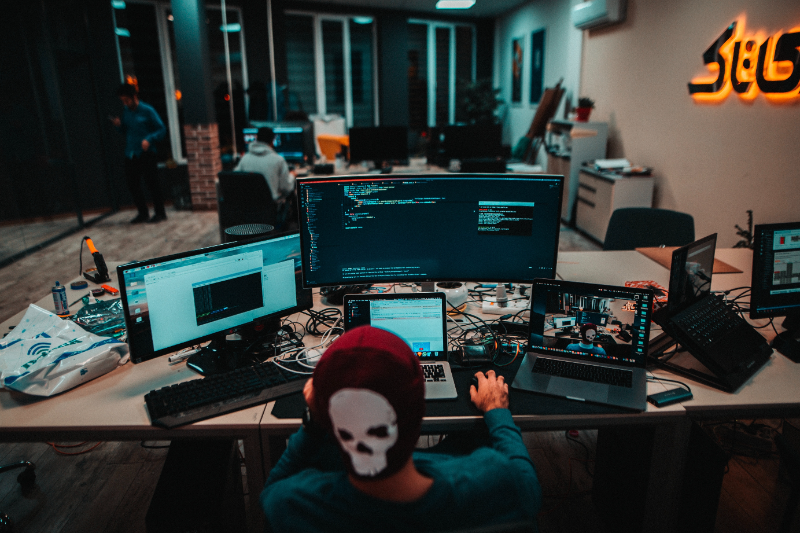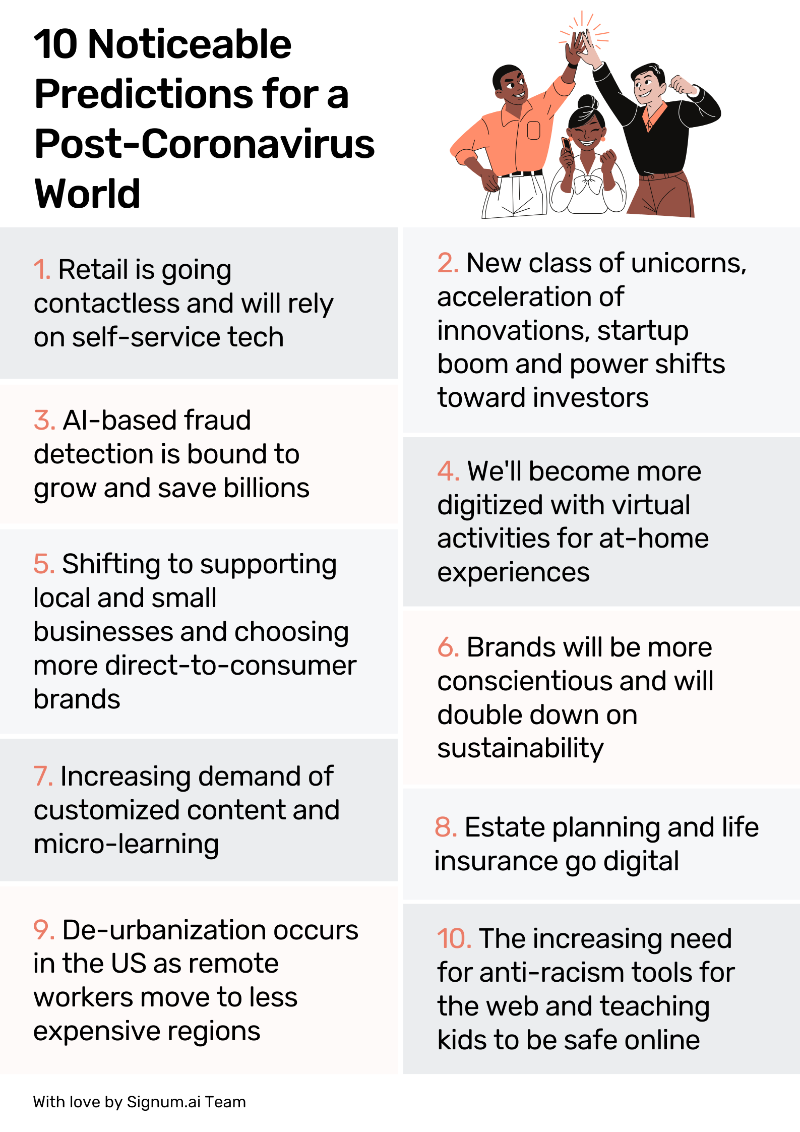- 1. Retail is going contactless and will rely on self-service tech
- 2. New class of unicorns, acceleration of innovations, startup boom and power shifts toward investors
- 3. AI-based fraud detection is bound to grow and save billions
- 4. We’ll become more digitized with virtual activities for at-home experiences
- 5. Shifting to supporting local and small businesses and choosing more direct-to-consumer brands
- 6. Brands will be more conscientious and will double down on sustainability
- 7. Increasing demand of customized content and micro-learning
- 8. Estate planning and life insurance go digital
- 9. De-urbanization occurs in the US as remote workers move to less expensive regions
- 10. The increasing need for anti-racism tools for the web and teaching kids to be safe online
- About the author
10 Noticeable Predictions for a Post-Coronavirus World
June 24, 2023 7 min. read

Contents:
Boost your revenue today
Сhat with our expert on how to turn existing CRM contacts into revenue
The world as we knew it before will never be the same. The pandemic is reshaping everything from how we work and shop to how we exercise and socialize. There was a great post by Emma Rose Bienvenu that got a lot of traffic where Emma shared her 7 predictions for a Post-Coronavirus World and named remote work, automation, and telemedicine as the key trends shaping our new normal.
Here are 10 more trends that are reshaping the present and will likely have a long-lasting and evolving impact on the post-coronavirus-19 world.
Although no one can be 100% certain of all the ways this pandemic will affect our economy in the long-term, using predictive analytics, we can make deductions with a high rate of confidence based on current patterns.
1. Retail is going contactless and will rely on self-service tech
Appointment shopping, contactless checkout and self-service tech – these are the key elements that preserve social distancing that most retailers are planning to implement as they reopen. Even once the spread of the virus slows drastically, many people will likely still be concerned about going to physical stores for some time.
Retail brands will be exploring different contactless technologies, meanwhile, strengthening their online presence and building omnichannel experiences.
Thus physical stores will be reinvented — they will no longer be the centerpiece of a retail business, but rather an extension of the omnichannel experience.
There will also be changes to store layouts, some of which may be permanent. Experiential retail will most likely evolve with less focus on drawing in large groups for high-touch experiences. Digital shelves will take precedence, allowing retailers to refocus efforts on shopper safety. The economic losses caused by closures of physical stores and the need to recover sales will push brands to be more creative, leading to the creation of lots of inspiring and out-of-the box new initiatives and campaigns.
2. New class of unicorns, acceleration of innovations, startup boom and power shifts toward investors
New startups, brands, and innovations will emerge, targeting post-COVID-19 behavioral shifts. Most likely there will be a new class of unicorns that will include either existing companies that will do a quick pivot and identify a new much more attractive business model or completely new companies that were founded during or right after coronavirus.
There is already a big trend for the spontaneous entrepreneurship market. As the pandemic quickly turned the economy and our daily lives upside down, creative entrepreneurs began to develop solutions. For example, Greg Isenberg, Head of Product at WeWork, recently developed a website for online hairdresser classes. Hair salons are closed in most countries, thus a new market has developed full of people who are willing to pay for such lessons.
Meanwhile, economic power is shifting toward investors as the available pool of capital diminishes. VCs and portfolio companies will have diminished access to capital and will consequently expect startups to show higher revenues, greater margins and faster paybacks.
3. AI-based fraud detection is bound to grow and save billions

During the epidemic, US residents have received countless fraudulent calls, some even losing thousands of dollars on scammers pretending to be medical or government representatives. Swindlers were taking advantage of the global health crisis. As the influx of fraudsters grows, society is increasingly calling for effective anti-fraud tools.
AI-based fraud detection tools are already being actively used by insurance companies and financial institutions, however, the need for fact checking is growing in other sectors as well. The unprecedented combination of the confusing global health crisis we’re currently experiencing alongside global connectivity thanks to the internet, has made way for a wave of false facts and content being shared about COVID-19.
Inaccurate information and news about coronavirus are distributed through instant messengers and emails. There is a growing trend and demand for AI to fight misinformation. While the international community advises each of us to be conscious of information forwarding, the facts are that some fake messages contain true data, so some users simply do not notice false themes. Be careful!
4. We’ll become more digitized with virtual activities for at-home experiences
This category is obviously on the rise now and there is a high chance it will stay popular after the pandemic since we’ve now had the chance to experience certain conveniences widespread digitization can bring and how many more opportunities it might open. This includes virtual events, virtual tours, guides, digital experiences and virtual travel.
It would be worth mentioning the recent success of Universal Pictures when they offered to release new movies for home rental instead of waiting for movie theaters to reopen. Their Trolls World Tour at-home digital premiere was a big hit and became the biggest debut for a digital release.
Notably, as the tourism sector also suffers huge losses, organizations have had to figure out how to move online. Zoos, theaters, museums and other cultural venues have started offering free virtual zoo tours and shows. Other examples include virtual experiences and activities from Airbnb, San Diego Zoo, California Science Center, American Museum of Natural History and others.
5. Shifting to supporting local and small businesses and choosing more direct-to-consumer brands
As small businesses have gotten affected the most by COVID-19, many people have jumped in to support them. The pandemic has instilled in many consumers a greater interest in shopping local. People want to support their favorite coffee shops, breweries or dress boutiques — so that they don’t go out of business.
As a result, it seems that there will be greater interest in buying from local brands and supporting smaller businesses in the future, even post coronavirus. The crisis has made more people realize how much they appreciate mom-and-pop shops and a stronger connection based on shared values with the direct-to-consumer brands.
6. Brands will be more conscientious and will double down on sustainability
Given the current environment, it’s no surprise that retailers and brands have overall minimized their sustainability programs for financial reasons. However, interestingly, we are now observing a new trend of consumers choosing more and more brands that are sustainable or conscientious. As a result, many brands and retailers are now looking for sustainable packaging options to reduce their carbon footprint as ecommerce and delivery continue to grow.
Retailers will find ways to limit waste throughout the supply chain optimization as consumers grow more concerned about sustainability.
The supply chain will become increasingly transparent as consumers demand more information on where their products come from and how they’re produced.
7. Increasing demand of customized content and micro-learning

There is a booming demand for e-learning, specifically for learning new hobbies or skills during the quarantine. People want to apply their newly freed up time to learn something new in a short period of time that doesn’t require applying for a degree or enrolling in a full-year course. The Edtech market is growing in size and value. Mini-MOOKs, or micro-courses, are direct in their content delivery and short enough that you can learn something while standing in line, waiting for a cup of coffee, or on the way to work. These courses are being used to get continuing credits credits, improve professional qualifications and for onboarding at various organizations. There was already an increasing demand for micro-learning before COVID-19 outbreak where the market was growing by 46% every year, but in the last few months we’ve seen it accelerate.
8. Estate planning and life insurance go digital
Young families often do not pay enough attention and time to estate planning or life insurance. More and more people are interested in simplified solutions, e.g. services and applications, to help with planning and to avoid being taken by surprise down the line. Coronavirus has become a catalyst for more people to think about their future. According to Google, requests for “probate” have risen sharply since March 8. Demand for applications that allow people to make wills and take out life insurance has grown 2-3 times in just this past month.
9. De-urbanization occurs in the US as remote workers move to less expensive regions
We have already seen this as many people have moved back to their hometowns to ride this out. The question is whether they’ll ever return. Even more people are considering moving from urban areas to rural areas for budgetary reasons and because they’re not limited by their office location anymore. In some cases, people have discovered that it is much more pleasant to live outside of urban areas. This pandemic could stall or reverse America’s urbanization. There might be a new term coined soon “the great coronavirus migration”.
10. The increasing need for anti-racism tools for the web and teaching kids to be safe online
The online space has always been full of bullying threats and was not a safe space for children, but as with many other trends, coronavirus had accelerated it and increased the need for anti-racism tools for the web and to teach kids to be safe online.
The coronavirus origin in China has led to an increase in internet hate and real cases of aggression against Asians. The common panic about the pandemic is only contributing to the escalation of anti-Chinese sentiment.
It’s not a secret that the growth of racial hatred occurs because aggressors are little aware of the problem and ethical standards. Society needs tools to counter racism on the Internet, just as much as in real life, of course.
As for kids, the parents are concerned that quarantined children spend much more time online. Experts emphasize that it is an important period to teach children proper communication to avoid long-term harm to their health and social skills.

About the author
Artem Gladkikh, Founder & CEO Signum.ai
Serial Entrepreneur with 8-year experience in Business Growth and building and growing digital products. AI Startup Founder. Community Builder. AI & Business Growth Expert. Previously founded one of the most popular services for remote job search Talentboard.me. Currently, focus on building Signum.ai and helping more companies leverage AI to automate their sales and marketing and increase their efficiency.
More useful content on our social media:
